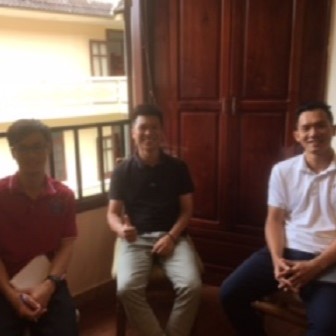Peter MALONE
When the Light Breaks
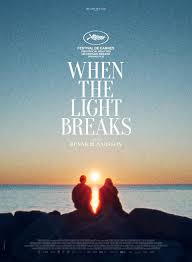
WHEN THE LIGHT BREAKS
Iceland, 2024, 82 minutes, Colour.
Elin Hall, Katia Njalsdottir, Mikael Kaaber, Agust Wigum, Gunnar Hrafn Kristhjansson, Baldyr Einarsson.
Directed by Runar Runarsson.
The title is rather poetic and there are scenes of sunrise and sunset and the vistas out to sea.
However, the film is a blend of serious themes and a portrait of young adults coping and not coping with grief. At the centre, is a young woman, Una, in a relationship with a fellow student, a long sequence of their night together and his intending to break off with his long-time girlfriend the next day.
However, with a very long tracking sequence, cars in a tunnel and an explosion where he is killed.
Una is in shock, has to deal with the death, the secrecy about her relationship, dealing with the group of friends and, eventually, the arrival of the girlfriend. The group is erratic in its emotions, in its grief, outpourings, drinking, bickering. But there is a bonding between the two young women – although Una does not reveal the truth.
Acclaimed by critics, younger audiences may identify with the characters and their lifestyle – but older audiences may find their behaviour less than mature, tiresome.
- The title, the scenes of the sky, the sun, rising and setting? Visual symbolic sequences?
- Iceland, the landscapes, the seascapes, the coast? The town, the church, the streets, the Square, the restaurants? The musical score?
- Setting the scene, Una, Diddi, the relationship, the night with each other, conversation, his intending to break off with his girlfriend? The next morning, the plans for the day, the couple, their friends, studies?
- The long sequence visualising the tunnel, the explosion, its impact? The deaths, Diddi’s death?
- The main part of the film about tuna and the friends, the news of the death, disbelief, shock, grief, the details of how they handle the situation, talking, part joking, part sadness, the drinking, going the rounds? The different characters, the relationship with Diddi, from the past, confidences, their interactions?
- The effect on Una, her loss, the difficulty of the arrival of Katia, Diddi not having broken off with her, their interactions, their eventually bonding, the closeness, but Una not telling the truth?
- The overall impact of the film, a portrait of young adults in the 21st-century, the differences from their elders, their lifestyles, manner, relationships, grief?
Hemel
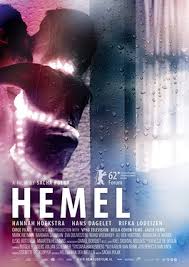
HEMEL
Netherlands, 2012, 80 minutes, Colour.
Hanna Hoekstra, Hans Dagelet.
Directed by Sacha Polak.
A brief Dutch film focusing on sexuality, promiscuity, father daughter relationships. It runs for only 80 minutes.
The title, which means “Heaven”, is actually the name of the central protagonist. The film opens with her involved in sexual activity, frankly visualised, and the audience soon learning that she regularly has stands with men, the audience seeing one of the men trying to be tender after the intercourse but her rejecting this.
It emerges that she is very close to her father, a widower, with a flair for younger women, an auctioneer. The pair have been close since her childhood, which looks, sometimes, uncomfortably close – dramatised in a scene with a visit to the opera.
Hemel also visits her ex-stepbrother, a man with rather strict Protestant principles upset after a violent episode..
When her father takes up with a woman, there are tensions within the relationship. Hemel continues, having a relationship with a married man. And discussions with him.
This film could be compared with 99 Moons, a Swiss film about a woman with sexual problems and identity.
Tundra Within Me, The
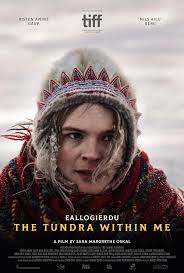
THE TUNDRA WITHIN ME/ EALLOGIERDU
Norway, 2023, 95 minutes, Colour.
Risten Anine Kvernmo Gaup, Nils Ailuy Kemi, Berit Anne Oskal Kemi, Elias Ante Pilutaq Gaup Lennert.
Directed by Sara Margrethe Oskal.
This is a film for the Sami people, in the northern areas of the Scandinavian countries, memories of their culture, its being more accepted, the language, behaviour, sense of humour, and the hurting of reindeer.
The focus of the film is on Lena, an artist, her husband leaving her to start another family, bonding with her son and deciding to move back home, a project to explore women as managers in reindeer herding. It emerges that she had been skilful this in the past telling her heard and moving to the city to pursue her art.
She returns to the north with her son, meeting again with her mother after neglecting visits, incurring suspicions from the other townspeople with memories of her. She encounters reindeer herder who likes his work but has not given free rein by his mother who continues as the management herder.
Almost needless to say, the romance is to be expected, and some ups and downs before final resolution. And the son finds it congenial to stay in the north.
While the focus of the research is on women herding managers, there is also the focus on Lena’s art, somewhat graphic, startling, very much feminist in protest against women’s subordinate roles.
While the setting and the photography of the snowclad region and the herds of reindeers are striking, the characters are much as expected.
- A story of Sami culture, Norway, the people, the language, the customs, their sense of humour, the reindeer herding, social life, the bar, shops, bones? The musical score?
- The location photography, the snowclad vistas, the reindeer herds, homes, the club, the details of farm work?
- Lena’s story, family background, husband and new family, with her son, her art in Oslo, its style, her feminist issues? Her relationship with her son? Leaving the North, her memories, clashes with her mother, the bus return, the bus hitting the heifer, arrival, the accommodation, setting up a studio, the interactions with her mother, her mother welcoming her grandson? Settling in, the project, female reindeer herding managers, her own back experience, selling the herd, moving away?
- Mahtte and his story, the accident with the heifer, glimpsing him, relationship with his mother, the reputation of his father, working with his uncle? His mother managing the herd, not handing over to her son? His brother and moved to the city, courses? Mahtte, his personality, friendships in the town, with a fellow herder and expectations of romance? The encounters with Lena, with her son, scooter ride, the rehabilitation of the heifer, his mother fixing the dislocation? Inviting Lena to the celebration?
- People in the town, the different attitudes towards Lena, her wanting interviews, Mahtte promising his mother, the attitudes of the women spurning her, too busy? The sympathetic woman and the interview? Her going to the club, the competition, celebrating her father, emotional, friendship with Mahtte, her leaving, her winning the competition? Her friendship with the owner, from the past?
- Her artwork, the visuals, feminist? Her place at home, the herding, the episode with Mahtte and the lassoo? Her skills? The growing relationship with Mahtte?
- The tensions, the relationship, her ambitions, the city or not? Discussions with her mother? Her son settling in, his friendship with Mahtte?
- The scenes of outdoor action, the roaming herds, the boundaries, the different owners, the mingling of the herds, capturing of the reindeer, marking them for ownership?
- Lena and her intervention, her regrets, her judgments on Mahtte? The final decisions? Reconciliation, her son, the future?
Missile, The/ Ohjus
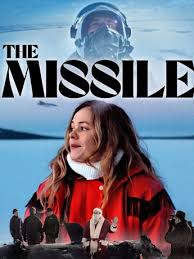
THE MISSILE/ OHJUS
Finland, 2023, 110 minutes, Colour.
Oona Airola, Pyry Kahkonen, Hannu-Pekka Bjorkman.
Directed by Mila Tervo.
The film is based on actual events, 1984, a Soviet missile landing in Finland, the search for the missile and the potential dangers, the attitude of officials, the international media, speculation about a mission, nuclear dangers, especially for Europe.
The film was described as “absurdist”. On the one hand, there is the domestic story set in this remote part of Finland, a woman a victim of domestic abuse, her husband in prison, with her children, with her family and the preparation for a wedding. On the other, there is the international situation as regards the missile, serious investigations. It will depend on cultural nuance and senses of humour to appreciate how well this absurdist combination works.
The film becomes more serious when the young woman causes an accident to the window of the local newspaper office, offering her services in writing for some kind of compensation. The editor is very much concerned about small local stories. She begins but with the news of the missile, she draws on her abilities for research, reading and background, her skill in writing. She then began serious investigation, interviews, writing, dramatised in some detail.
And, then the military observers come in, the search, the focus on a young pilot who is forthright in his comments, encounters the young woman, helps her with research, has a relationship with her. There is seriousness in those coming to investigate but there is also some satire in an obstinate official who tries to sabotage all the opinions of an Estonian expert who is brought in to explain the dangers.
While audiences outside Finland might find this an interesting look at the particular culture, the film is very much for a local audience.
- Screenplay based on an actual incident, the Soviet missile, landing in Finland, the potential dangers, the investigation, cover up?
- The combination of the investigation with the story of the violence, her family, the wedding, the accident and her wanting to offer compensation by work, investigations? And the romance element?
- For audiences in Finland, culture and sensibilities, audiences outside, appreciating not appreciating the Finish culture?
- The focus on Niina,, domestic abuse, her husband, his art, in prison, his later getting out, reuniting, attacked by his sister-in-law, accepted by Niina, relationship with his children? Niina and the children in the forest, the trees, the wagon, getting loose, crashing into the window of the newspaper office? The reaction of the owner, anger? Her making her case, offering to work?
- The newspaper, local, domestic articles, reports, the owner, the cost of the window, allowing Niina to work, her poems, the accident report, her background, reading, writing?
- The domestic sequences, her sister, the wedding dress, family background, the old man and his memories of World War II (and is giving information to Niina, the pathos of his death and funeral)? The raucous ceremony, Niina asking the editor for some money? Her buying toys for the children?
- The indications of the missile landing, television, the wedding party not taking much notice? The point being made about serious matters and the public carrying on as normal?
- The arrival of the military, the personalities, the meetings, the discussions? The issue of the accident or deliberate? The arrival of the expert and her explanation about the contamination details? The haughty representative and haughtily trying to undermine her at every moment? The military, listening, cover-ups?
- The film described as “absurdist”? The blend of local colour and ordinary life, the touches of the raucous aspects of the community, serious investigation by Niina, the official meetings, the speculation about the missile, nuclear head, headed for Hamburg?
- The arrival of the international media, the interviews, the discussions? Finland’s attitude towards Russia, subservient?
- Niina’s story, her continued investigations, interviews, research, conclusions,? Her writing the stories? The contrast with the owner, at the hotel, interested in the cooking, reaction to Niina?
- Repola, pilot, his mission, with the of the military, at meetings, his speaking up, ousted? The encounter with Niina, her intruding into the men shower, the later discussions, the relationship? His information? Speaking up at the meeting, the official ridiculing him?
- The outcomes, the news item about the missile, Finland and Soviet relationships, international crescent observations? Niina, the relationship with Reploa, her husband’s return, her future?
Maxxxine
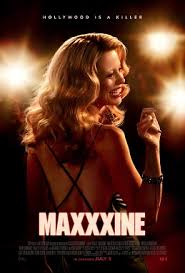
MAXXXINE
US, 2024, 104 minutes, Colour.
Mia Goth, Elizabeth Debicki, Bobby Cannavale, Michelle Monaghan, Kevin Bacon, Lily Collins, Simon Prast, Giancarlo Esposito, Moses Sumney.
Directed by Ti West.
In recent years, writer-director Ti West, has directed many television episodes. However, he made his mark around 2010 with some horror films, especially The Innkeepers. He also made a revenge Western, In a Valley of Violence, 2016, with Ethan Hawke and John Travolta. Then he made X, something of an exploitation film at a mansion out in the countryside of the Midwest. It featured Mia Goth. And it was a commercial success.
West then decided to go back in history and make a period piece, again about an ambitious actress, again played by Mia Goth, Pool. And with the same somewhat sensationalist themes and treatment.
This is the third film in his trilogy, this time set in 1985. And the audience is taken to a version of Hollywood of that period, a style of cinematography that is garish and sometimes lurid, as a symbol and as a location for part of the climax. West is enthusiastic about this portrayal of Hollywood, emphasising the seedy side, cheap apartments, video stores which were becoming popular at the time, the adult movie industry, sleazy agents in their offices. There is also the world of filmmaking, auditions, the movie lots, a visit to the Psycho motel as well as action there, sinister mansions in the Hollywood Hills. Very strong on atmosphere – and with many of the songs of the period, as was all kinds of in the occasions, billboards, almonds theatre, the stars on the walk of fame, cinemas showing St Elmo’s Fire.
Once again, this is a showcase for Mia Goth who seems to relish her performances as actresses who have more than relish and ambitions for their careers. And the supporting cast is more notable, Elizabeth Debicki as a somewhat pretentious and ambitious director, filming a sequel to The Puritan with all kinds of religious right protesters outside the studio with their placards. Kevin Bacon offers something of an absurd private eye who gets a dreadful comeuppance. Bobby Cannavale and Michelle Monaghan are the investigating police, he a would-be actor, she rather stern and critical. Lily Collins has a cameo as a British actress, Giancarlo Esposito is the agent, and Simon Prast who was a religious fanatic in X is even more terrifying here as Maxine’s avenging father.
So, a mixture of exploitative ingredients, sex, violence, ambition, religious intolerance.
- The work of the director, his trilogy, themes, moviemaking, collaboration with Mia Goth?
- The relationship of this film to the other two? Characters, themes, movies, sexuality and exploitation, violence and murder, ambitions and ruthlessness, religious fanaticism?
- The title, Maxine, from Miller to Minx, adding the Xs to her name? Her car number plate? And the way that she ruthlessly drove her car?
- The prologue, the little girl, dancing, the interview with her religious father? All of this sequence in the revelations of what was happening?
- 1985, Hollywood, the sign and symbol, the streets, the stars and Grauman’s theatre, garish look, lurid touches? The streets, the motels, the studios, legal offices, Universal lot, the motel from Psycho, exteriors and interiors? The musical score, the range of songs from the 1980s?
- Maxine, in Los Angeles, the move from Texas, ambitions, to get the life that she deserved, her intensity, the adult movies, pornography, her reputation and people recognising her at the studio? Her friends, performance? The apartment, moving from job to job, the video store, the owner, conversations, watching videos with him, enlisting his help to identify the mysterious video and its origins? His relationship with Maxine, exasperation with her? The brutality of his murder and her response to his being carried out?
- The audition, the film, The Puritan, the sequel? The director, imperious presence, height, not American accent, expectations? The interview, her being in adult movies, her body? Her getting the part? Going back to the studio, the interviews with the director, her demands? The scene of making the cast of her head, the past memories, her panic? And the later final sequence with the cast of her head in the glass? The background of the, Night Stalker the many deaths, and her friend, their discussions, the discovery of the two dead bodies, the symbolic mark?
- Mysterious video and her watching it, her panic? The address of the windscreen? The encounter with John, Kevin Bacon and the satiric performance? Confrontations, pursuit, his threats and self-confidence? Not identifying the employer? The drinks and conversation? Is appearance at the studio, the pursuit and chase, the weapon and her wound in his nose? The later encounters, the Psycho motel? Her explaining this to her agent, Ted and his personality, manner, sleazy? The confrontation with John, and the brutal crushing of the car and him?
- The police officers, the would-be actor and his performances, the tough woman in charge? Confronting Maxine, with the death of her video store friend, the continued interrogations, her refusal to answer, the threats?
- Demonstrations, against The Puritan, the religious right? Protests and placards?
- The buildup to the climax, Maxine and her fears, the decision to go to the address, the detectives deciding to follow her, her entering the house, eerie, discovering her father, his speeches, showing her the video from her childhood, the massacres in Texas, fleeing? Her father, religious fanatic, his campaign, stamping Satan out of Hollywood, his followers and the ritual, the attempt to exorcise Maxine, tying her up, close-ups of his face, the arrival of the police, the shootout? Maxine free, confronting her father, eventually shooting him? The detectives, shot, wounded, dead? The hovering helicopter?
- The aftermath,, Maxine as a celebrity, the interviews, the director and her advice? Set, her becoming respectable, the plaster cast of her head?
Retreat for our Vietnamese students with John Mulrooney MSC
Retreat for our Vietnamese students with John Mulrooney MSC
John Mulrooney writes from Vietnam.
Our Vietnamese students have been on annual retreat for the past week in Da Lat and will finish tomorrow just in time to start the next gathering/discernment previously reported on the website.
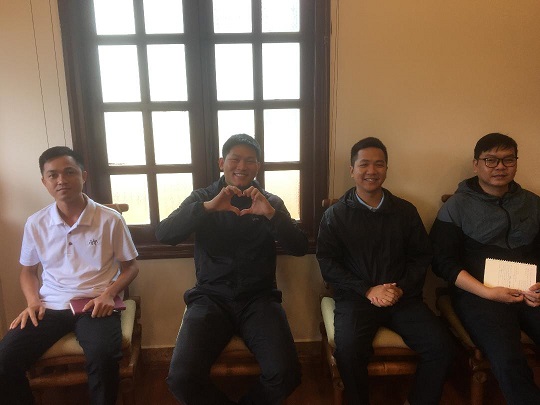
I have been journeying with them on retreat with Jorge Bergoglio (Pope Francis) as there is such a wealth of his teaching available to us. We have reflected on God’s love for us; God’s mercy and forgiveness; what it might mean when we ‘live by holiness’; how we have been called and sent; the call to ecological conversion; the call to synodality and the power of love. We have shared stories of MSC who have gone before us and can inspire us to mission.
We have been up in the mountain area of Da Lat and it has been quite chilly and very wet as it is the rainy season. I had hoped to escape some of the Bowral winter while here but I think I brought it with me.
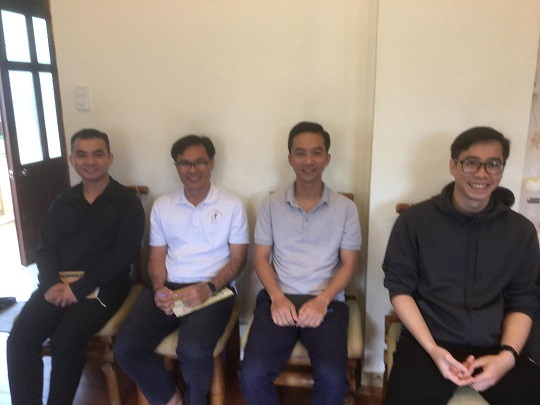
Our students are a wonderful group of young men. Although ‘young’ is a relative term as they are in their 30’s and one is already in his forties. They live very busy lives. Most have been on pastoral placement the past five weeks immediately after finishing studies in the seminary; one day back in Ho Chi Minh city and on the bus to Da Lat; as soon as we finish retreat they go straight into the discernment process with Khoi and his team. No rest for them at all.
We give thanks for each of them and the gifts they bring to our mission to be who God is in the world.
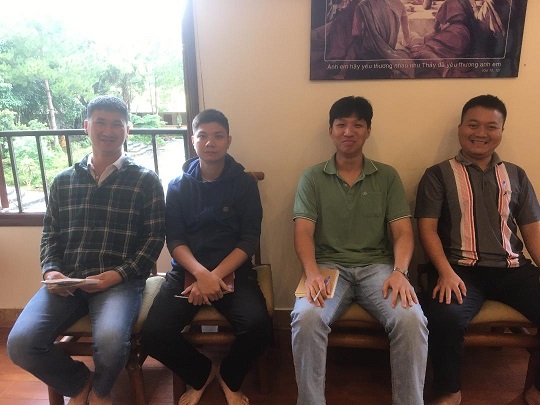
We also pray with them during the reflection time ahead.
Ezra
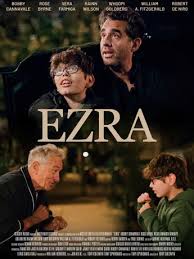
EZRA
US, 2023, 101 minutes, Colour.
Bobby Cannavale, William E.Fitzgerald, Rose Byrne, Robert De Niro, Whoopi Goldberg, Tony Goldwyn, Rainn Wilson, Vera Framiga, Matilda Lawler.
Directed by Tony Goldwyn.
While there have been a number of films dramatising autism and its effect on those on the spectrum (for example the very striking Temple Granted with Claire Danes), this is very audience-friendly look at an autistic boy.
Audiences will be sensitive to the issues, the emergence of awareness of autism in more recent decades, consequences for family life and parenting, for education opportunities whether in the community or specialised schools, the issues of medication for “normalising” the autistic person.
The screenplay for this film was written by Tony Spiridakis, based on his own experience with his son and, as he has noted, his learning how to finally step back from trying to control his son’s life. He has been a long-time friend of the actor-director, Tony Goldwyn, and Goldwyn has directed this film as well as taking a small role.
‘The film also had multiple autistic crew members on set to ensure its authenticity. Other cast members were directly related to a family member who has autism. Throughout the production, the creators screened different versions to the autism community for feedback.’ (Wikipedia entry on the film.) This is the case with Robert De Niro who plays the grandfather here.
Film opens with Ezra aged about 11, having great difficulties at school, fighting, on the verge of being suspended. Young William A.Fitzgerald is very convincing as Ezra. His parents are divorcing. He lives with his mother, Jenna, Rose Byrne, devoted, anxious, supported by her lawyer, Tony Goldwyn. But there are frequent visits from his father, Max, Bobby Cannavale very powerful and emotionally-charged in perhaps his best screen performance. He plays a stand-up comic and writer, taking his son to the performances as his supportive Mojo. However, he wants his son to be “normal”, in ordinary school with ordinary students, and is highly suspicious of any medication for the autistic condition.
Max lives with his father Stan, De Niro, asserted past which need some kind of resolution and apology.
The film dramatises the plight of the young boy, determined, sometimes fixated in autistic mode, devoted to each of his parents.
After an incident, almost an accident with Ezra being injured on the street, Max’s tension becomes even higher, assaulting the doctor in the hospital, arrested, a restraining order, becoming desperate and kidnapping his son, intending to travel to Los Angeles for a spot on the Jimmy Kimmel show, organised by his agent, played by Whoopi Goldberg.
With police intervention, Max takes refuge in the home of an old friend, a sympathetic Vera Farmiga, whose daughter involves Ezra in play, and introducing him to a horse, patting it, befriending it, some moments of freedom and joy.
The climax occurs in the Jimmy Kimmel studio, Jenna arriving with Max’s father, the police and the authorities, clash, Max arrested.
However, there is a more peaceful ending, Max calming down, Jenna and caring for Ezra – and an enjoyable Jimmy Kimmel show postscript.
An audience-friendly film on issues of autism.
- The focus of the with police intervention, film on Ezra, age, autism, symptoms, behaviour, relationship with father, with mother, was grandfather?
- The New Jersey setting, homes, streets, schools, police precincts, jails, comedy clubs? The American countryside, the journey to Michigan, the farm, the horses? The roads, diners along the way? The Jimmy Kimmel studios? The musical score?
- The screenplay, Tony is very darkness and his experience with his own son, the cast with family connections to autism, autistic members of the crew? The testing out of sequences?
- The audience entering the situation, Max and Jenna, marriage, Ezra, is autism, the years passing, is experiences at school, the parent being called in, the violence and his outbursts, expulsion?
- Max, his devotion, taking Ezra to his stand-up comic digs, his Mojo? Ezra and his responses? The bond between father and son? Jenna, the day by day care, the divorce proceedings, a relationship with Bruce, lawyer, his advice? The scenes at home, care for Ezra?
- William A.Fitzgerald and his presence and performance as Ezra? Manner, the symptoms of the spectrum, way of speaking, movie quotes, reactions, violence, not being touched, bananas, phobias? It shrewdness? At home, at school? His dislike of Bruce? Going to the club, the theme of the big Lebowski? Home late? Jenna’s reaction?
- Robert De Niro is the grandfather, Pop-pop, the back story as it unfolded, difficult, cooking for the military, hard on his wife, her abandoning the family, Max thinking it was to blame? Living at home with his father, the memories of the past, his father’s severity, violence? His father as a doorman at the hotels? Max taunting him about his parking sign, his military service, cooking? The difficult relation with Jenna?
- Max, relationship with his agent, Jane, her bookings for him, his performance after the experience of Macs, overhearing Bruce, interpreting literally, rushing out, the dog, taxi, hospital? Maxes hope reaction at the hospital, attacking the doctor, the arrest, the police, release, his doing a deal? The performance of the club and it’s sad ending, is talking about his doing the deal? The decision to abduct Ezra? Is being on probation with the law? Phoning his father?
- It is, the discussion about medication, maxes hostility, saying the doctors were exploiting the drugs, political issues? Jenna finally desperate, calling the police, their upbraiding her because of the delay, the Amber Alert? On television, the roadblocks…?
- Max and his friendship with Nick, Nick in the camp, the Senegalese nun, Ezra tantrums, metallic cutlery, the eating with their fingers…? Nick, support for Max?
- The journey, Ezra and his reactions, returning to his roots, police cordoned, driving through the woods, stranded, Ezra running away, reconciliation, getting the lift, going to see Grace, who welcome, memories of the past, Ezra with Ruby, the other children, her helping him to befriend the horse and its effect on him? Running and playing? The police arriving, grease giving them the car, travelling to Los Angeles?
- Jenna, desperate, trying to contact the grandfather, throwing stones at his house, at his work at the hotel, his finally telling her where they had gone, the drive, the attack on Nick?
- Grandfather see father and son in the diner, relating will, talking with Max, his confession about the past and his sorrow?
- Everybody in Los Angeles, the Jimmy Kimmel studio, the preparation for the gig, the police arriving, the Amber alert, Ezra and not wanting to be touched, the police, cuffing his father, Ezra’s attack, generally desperate?
- The aftermath, Max on probation, working with Jenna, the school, his taking him? Possibilities for Max to accept reality, not wanting to control?
- The credits sequence, Jimmy Kimmel, the return to the studio, the joke about being arrested, performance?
Cannibal Club, The
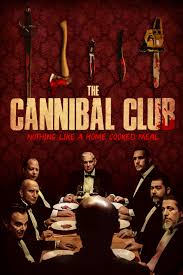
THE CANNIBAL CLUB
Brazil, 2018, 82 minutes, Colour.
Tavinho Teixera, Ana Luiza Rios, Pedro Dominguez, José Maria Alves.
Directed by Guto Parente.
The title is very direct and the film is a portrait of a cannibal club. This is not a film for the wide audience. Rather, this is a satirical look at affluent societies, their seclusion in their self-satisfied world, pandering to their every whim, victimising and disdaining the rest of the world.
The director is noted for satire as well as for some graphic representation of his themes. And this is the case here, ugly scenes of murders, some graphic sexual sequences, and the distasteful (literally) presentation of meals and banquets of cannibalised human flesh.
The film is brief, making its points, intending shock moments.
The focus is on the couple, well off, living in a mansion, a staff, a boy at the pool who is later killed after a sexual encounter with the wife and becomes their meal. And there is the cannibal club, presided over by a wealthy businessman, scenes of very well-dressed elderly men (women excluded) having the cannibal meals and watching sexual activities and proclaiming moralistic stances.
The crisis comes when the head of the club is caught by the wife in a homosexual encounter – and their lives are in danger. They hire another pool boy with the same intentions – but, it ends with his turning the tables and eliminating the president and the husband and wife.
And, there you have it. Reviewers refer to Bunuel’s The Discreet Charm of the Bourgeoisie and Eating Raoul, the Hannibal Lecter films and television series. (In googling best cannibal films, a list of 144 titles appears, many exploitation films, many horror films.)
Exchange, The/ Canada
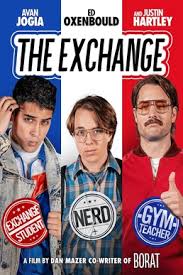
THE EXCHANGE
Canada, 2021, 93 minutes, Colour.
Ed Oxenbould, Avan Jogia, Justin Hartley, Jennifer Irwin, Paul Brownstein, Jayli Wolf.
Directed by Dan Mazer.
The Exchange is a lightly serious comedy. It has been written and directed by Dan Mazer, for many years a writer for Sasha Baron:Cohen in his Ali G television days as well as for his Borat films. Which means that it is a mixture of the raucous, sentimental, satiric.
This is a Canadian feature set in the middle of nowhere being introduced in most derogatory terms. The town is in decline. However, it has its pride, and its annual parade with its parade committee.
At the centre is a teenager, Tim, played by Australian actor, Ed Oxenbould (who has worked both in Australia and in the United States with some success). Tim is something of a nerd, his music tastes, his love for French New Wave films. And he is severely bullied at school. He devises the plan for having an exchange student from Paris.
Avan Jogia is Stephane, full on from his arrival at the airport, engaging with everyone, friendly, no holds barred, but really responding to Tim’s interests, Tim very disappointed, Stephane enjoying himself, especially with the girls, good sport…
Eventually, Tim and Stephane do hit it off, mellowing, but Stephane under suspicion from the rest of the town when there is sabotage on the emblem for the town parade. However, Tim defends him as does Tim’s father who was feeling the pressure of business failure and was about to set his store a light but Stephane intervened.
There is obnoxious coach who also acts as police officer for the town who turns out to be the villain.
Happy ending – and a postscript with Tim enjoying himself very much in Paris with Stephane.
- The title, exchange students, repercussions for the visitors, for the welcoming household, for the local community?
- The setting, remote, the derogatory descriptions, the isolated town, families, communities, community activities, companies and sales, decline? The musical score? The songs?
- Tim’s story, his age, at school, bullied and pushed around, his interests, The Smiths, music, the French and New Wave films? Reticent, awkward? At home with his parents? The friendship with Brenda, its ups and downs?
- The idea of the exchange student, Tim preparing the dossier, its being accepted, the choice of Stephane? Expectations? Tim hoping for a friend?
- At the airport, the likely candidate and his not being the one, and the end and this is exchange student’s bad reaction to the exchange? Stephane arriving, taking control? Stephane, his background, ethnic, suburbs of Paris, his perspective, irrepressible, speaking with everyone, ingratiating himself, at the airport, the school, with the secretary, teachers, the girls, skill at sport, knowledge of music, the sexual ethos of the students, back seat of cars sex, his participating?
- Stephane, welcomed by the family? Tim, finding it hard, trying to share experiences? The drive, Stephane’s behaviour, Tim and their hitting of the cow, his fears, revival, the bonding with Stephane? The change in Tim, sharing the experiences, filming the video, his friendship with Brenda, drinking, the comments on Brenda, the confrontation, breaking with her?
- The ethos of the town, the celebrations, the planning committee, the parade, the idea of welcoming diversity, the cynicism of the Egyptian man in the town?
- The coach, self-satisfied, his police role in the town, the receptionist and the relationship, his interventions, his sabotaging the event, the eventual explanation?
- Tim and his father, the business failing, the revelation of his trying to set fire to the store, Stephane intervening and saving him?
- The destruction of the emblem for the parade, everybody turning on Stephane? Tim defending him, the truth about his helping Tim’s father?
- The happy ending, reconciliation with Brenda, Stephane and his experience, everybody turning in favour of him? Tim and the changes?
- The aftermath and the scenes in Paris with the two together?
Treasure
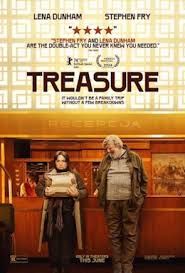
TREASURE
Germany, 2024, 111 minutes, Colour.
Lena Dunham, Stephen Fry, Andre Ennicke, Zbigniew Zamachowski, Wenanty Nosul, Iowna Bielska, Maria Mamona.
Directed by Julia von Heinz.
“Where your treasure is, there your heart will be.” And the treasure of the title? For the middle-age woman wanting to visit her family’s homeland, appreciate her Jewish heritage and the consequences of the war and concentration camps? For the man who had survived the camps? Treasure for each of them and a quest in re-visiting Poland, the setting 1991.
Treasure is based on a novel by Lily Brett, who grew up in Melbourne, living now in the United States, but a candidate for many of the Australian literature of awards, including the Miles Franklin, and awarded an AO in 2021. In the film is dedicated to the memory of her father – and a photo of father and daughter at the final credits.
There will be a variety of responses to this journey back to Poland, the older generation with its sad memories and the reality of the Holocaust and the Jewish genocide, a younger generation wanting to understand the past better. And there is the 21st-century audience, now decades-distanced from the events but wanting to know, understand and appreciate more.
This means that Treasure has had more effect on the wide range of audiences rather than affirmation by film critics who have been rather severe on the screenplay, the casting, the performances.
The performances are striking in their way, a difficulty being that both father and daughter are not immediately likeable difficult to identify with on this significant quest. Lena Dunham is Ruth, middle-aged, music journalist in the US, marrying her husband for his getting a green card and a divorce, the death of her mother a year earlier, a difficult relationship with her father. She is quite idiosyncratic, even carrying her breakfast cereals with her… A difficult role, but more immediate audience sympathy for her than for her father.
He is Edek, Stephen Fry, absolutely brilliant, domineering and controlling with a broad smile and flashing money to get his way, critical of his daughter and her life, casual in his approach to this journey back into the past. In fact, he rather wants to avoid going back to where he grew up in Lodz, wary of a trip to Auschwitz. But, this is Ruth’s quest and, eventually, they do go to see the family factory, now dilapidated, go back to the apartment block where the family lived, the new occupants apprehensive about being evicted, lying about the apartment being empty when they moved in, but the gradual discovery that they did have silver, crockery, coats from the past – and Ruth, desperate for mementos, bargaining to buy them.
And the visit to Auschwitz is important, the inmates not required to walk to the entry but allowed on the trolley, Edek finding the grown-over rail tracks where they disembarked, visiting the site of the hut where he lived, the workplaces.
While there are criticisms of the performance, of the relationship between Dunham and Fry on screen, of the screenplay, there is still value for a 21st-century audience sharing this journey of memory, journey of discovery.
- The title, the treasure for Ruth, the treasurer for her father? Recovering treasures from the past for treasures for the present?
The Polish settings, the countryside, the cities, the drab atmosphere, contrast with the luxury hotels, the old factory, the old apartment block and interiors, Auschwitz, 1991, atmosphere? The musical score?
- The film based on actual events and characters? The photos at the end? The father-daughter relationship, memories of the war, expulsion of Jews, Auschwitz in the camps, after the war, migration to the United States, the new generation, wanting to understand something of the heritage?
- Ruth, the casting of Lena Dunham, her screen presence, age, background, music journalist, planning the trip, accompany her father, wanting to visit Lodz where he grew up, wanting to visit Auschwitz, to see, to understand, to appreciate, to have some concrete memories? Her background, personality, green card for her husband, the divorce, her mannerisms, vegetarian, carrying the cereals…?
- Edek, the casting of Stephen Fry, his screen presence, filling the screen? His back story, life with his parents, the expulsion from their home, his wife, the train to Auschwitz, his dislike of travelling by train, memories? His life in the camp? To America, a happy life in America, the recent death of his wife? Grief? His domineering personality, impromptu decisions, spontaneous reactions to people, controlling and deciding? Interfering in his daughter’s life?
- The opening at the airport, Ruth and her tension, the father missing his plane, his explanations, her buying the train tickets and her careful planning, budget, his disregard, the encounter with Stefan, the taxi, hiring him for the whole trip? Stefan and his friendliness?
- The range of hotels, the accommodation, the father and his demands, adjacent rooms, splashing the money? The range of personnel at the hotels, the responses? Tadeusz, young, speaking English, wanting the autograph, hired as translator, his interventions with the family in the apartment? The bargaining for buying the souvenirs?
- Edek and his decision to go to the ghetto rather than to Lodz, the destruction of the ghetto, his wanting to have a wall, the photograph? Ruth and her demands, the visit to Lodz, drab, the visit to the factory site, the reaction of the young man, clearing the dirt and finding the tiles? Explanation of the manufacturing? The visit to the apartment?
- The issue of the apartment, the new family, moving in the in 1941, saying there was nothing there, the fear of being evicted, the crowded apartment, reactions? The discussions, the lie about nothing there? Silver bowl, the crockery…? Ruth returning, with Tadeusz, discussions, the silver, the price, her not wanting to haggle, the teapot, the discovery of all the crockery, and finally the coat? Her giving the code to her father, his breaking down, memories, tears? The photo of his parents? Looking at the range of photos? His finally wearing it?
- The visit to Auschwitz, the father and his reluctance, the arrival, the guide, Ruth saying that Auschwitz was not a museum but a death camp, revisiting the areas, her father identifying the rail tracks and their arrival, his place in the hut, work? The effect on both of them?
- Edek and his sociability, joining in the singsong the hotel during the night? Friendship, splashing money? The contrast with Ruth, glum, her breakfasts, her suspicions? The attempt to ring her former husband and hanging up?
- The two women, their jobs, the encounters, the conversations, flirtation? Edek his spending the night, the aftermath?
- The culmination of the trip, memories of her mother, sometimes distance of her father growing up, not weeping at the funeral? Her grief, her motives for visiting, packing her souvenirs? The future? Reconciliation with her father?

